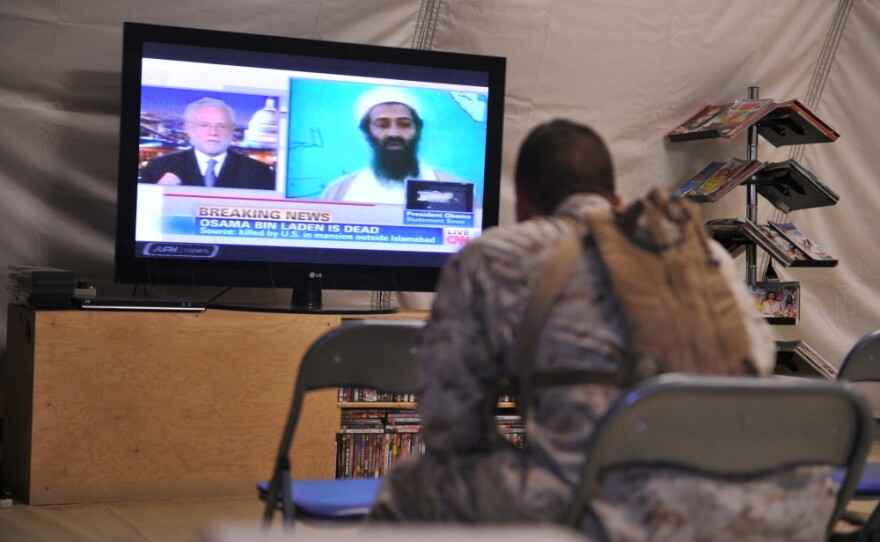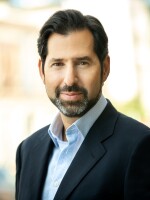It's pretty easy to see the winning formula for Fox News and MSNBC. They spend their evening hours stoking outrage from the political right and left, respectively.
But it's not as clear what the missing secret sauce should be for CNN. The cable news pioneer now continually lags in ratings during prime time, the most heavily watched hours.
Former Rep. Anthony Weiner once joked that CNN envied the audience of C-SPAN-3 — because tens of Americans were watching. Fox Business Network's Don Imus asked earlier this week how CNN could be "the most trusted name in news" — one of its past slogans — when "nobody watches them?"
Perhaps not nobody, but top shows on the Fox News Channel typically draw 2 million viewers or more. CNN's top prime-time shows attract about a third of that each night. And the network's new top news executive, Mark Whitaker, acknowledges CNN has been thrown off course.
"A big challenge for CNN now is to really decide who its audience is," he says, "and to really focus on doing the best job possible for that audience and not think it can be all things to all people."
Foreign Coverage
Whitaker, 54, has a family history with echoes of President Obama's background. Whitaker's parents were professors who met at Swarthmore. His mother, who was French, fled the Nazis as a child refugee in 1940 and became a French literature scholar; his father was an African-American political scientist whose research led him to take his son to live in England and Africa as a youth.
A big challenge for CNN now is to really decide who its audience is and to really focus on doing the best job possible for that audience and not think it can be all things to all people.
After graduating from Harvard, Whitaker spent 25 years as a reporter and editor at Newsweek, which he ultimately led as its editor-in-chief, and an additional four years as a top executive at NBC News. In February, he became CNN's managing editor and executive vice president, the network's top news official.
Whitaker sees similarities to the challenges that Newsweek first confronted years ago. The magazine had to change as newspapers published news analyses on a daily basis. Now, with the acceleration of the news cycle, cable viewers already know the day's big headlines from websites before they turn on the television. And so, he says, the TV channel requires re-imagining, too.
Whitaker says the news channel is taking stock, studying its audiences and its coverage to figure out where to go next. But given the network's rich roster of correspondents scattered across the globe, Whitaker says, he believes CNN's distinctiveness lies in its foreign coverage. He points to its handling of the uprisings in Arab countries, the tsunami and nuclear crisis in Japan, the riots in Greece and the political consequences of the killing of Osama bin Laden.
"We were making the commitment of airtime which allowed us not just to be there first, but once we were there, to tell the human stories — to do the in-depth analysis — to have the smart discussions in our prime-time shows," Whitaker said.
Breaking News
A review of coverage of international events undertaken at NPR's request by Pew's Project for Excellence in Journalism found that in the first six months of the year, CNN devoted a significantly higher proportion of its airtime to foreign coverage than its cable or broadcast competitors.

Whitaker is quick to say that CNN had already taken steps in that direction before his arrival thanks to Tony Maddox, CNN's executive of international programming, and Ken Jautz, the head of CNN's domestic channel. Whitaker and his fellow executives frequently paired correspondents and hosts from CNN's U.S. channel with those from CNN International and CNN En Espanol.
But that seems to yield larger audiences only when news flares.
"CNN is incredibly successful whenever there's major breaking news anywhere in the world," says former CNN correspondent Deborah Potter, now the executive director of the nonprofit journalistic training center NewsLab. "They are without a doubt the go-to network, and recent developments have proven that again.
"The problem is, the corollary is also true," Potter says. "When there is no major breaking news, the people tend to tune out."
Enterprise Reporting
Jon Klein, ousted last year as president of CNN's American network, tried to mint new stars — prime-time hosts Piers Morgan and Eliot Spitzer among them.
Whitaker says he's high on them and took pains to praise an interview by Morgan at a recent news planning meeting. But when Whitaker looks at the cable news landscape and the glut of political talk, he argues CNN need not be largely defined by the ideology of its hosts or by its treatment of politics. He says a non-ideological approach need not require a passivity by the channel's journalists.
"I think perhaps there have been times in the past when CNN would have people who represented extreme views — let them go at it in a food fight, and then sit neutrally in the middle — and then toss to commercial," Whitaker says, rapping the table with his hand. "Well, we're not going to do that anymore."
Instead, Whitaker is pushing for scoops and for more in-depth reporting, leading already to a series of enterprise reports focusing on such meaty matters as the flooding of the Mississippi, the search for jobs by the unemployed, and the prospects for success of the occupation of Afghanistan.
He's also championing crisper interviews that yield more insight. Fareed Zakaria, host of CNN's GPS and a former colleague at Newsweek, says Whitaker has already had a profound effect.
"CNN is getting smarter, and you can feel it in the stories," Zakaria says. "You can feel it in the depth with which they're covered, the kinds of people in terms of guests who are brought on air, the ways in which issues are discussed."
Zakaria argues the channel should ignore Fox and MSNBC and focus on more serious-minded rivals.
"The people who watch Fox are not going to watch CNN. Let's be honest," Zakaria says. He says people watching Fox are the faithful of a specific religion attending a particularly devout church. "Our competitors should properly be The New York Times, the BBC and NPR."
The Big Picture
CNN's bottom line is not tethered solely to its ratings. It makes profits of hundreds of millions dollars a year. Those sums are enhanced significantly by its international channels, its sister channel HLN, its website and the premium that cable providers pay to air its programming. But Whitaker says he hopes the intensively newsy spring has helped CNN to recover its sense of purpose.
"It gave people both internally and externally a sense that 'Yeah, this is CNN's mission, this is what their purpose is,' " Whitaker says. "But I think it also meant that we could also show we could go beyond breaking news."
Far too often, Whitaker says, cable news outlets are like 5-year-olds playing soccer — a mob all darting here and there — chasing the story of the moment as one. CNN, he argues, needs to keep its eye on the full playing field.
Copyright 2022 NPR. To see more, visit https://www.npr.org. 9(MDAzMjM2NDYzMDEyMzc1Njk5NjAxNzY3OQ001))







